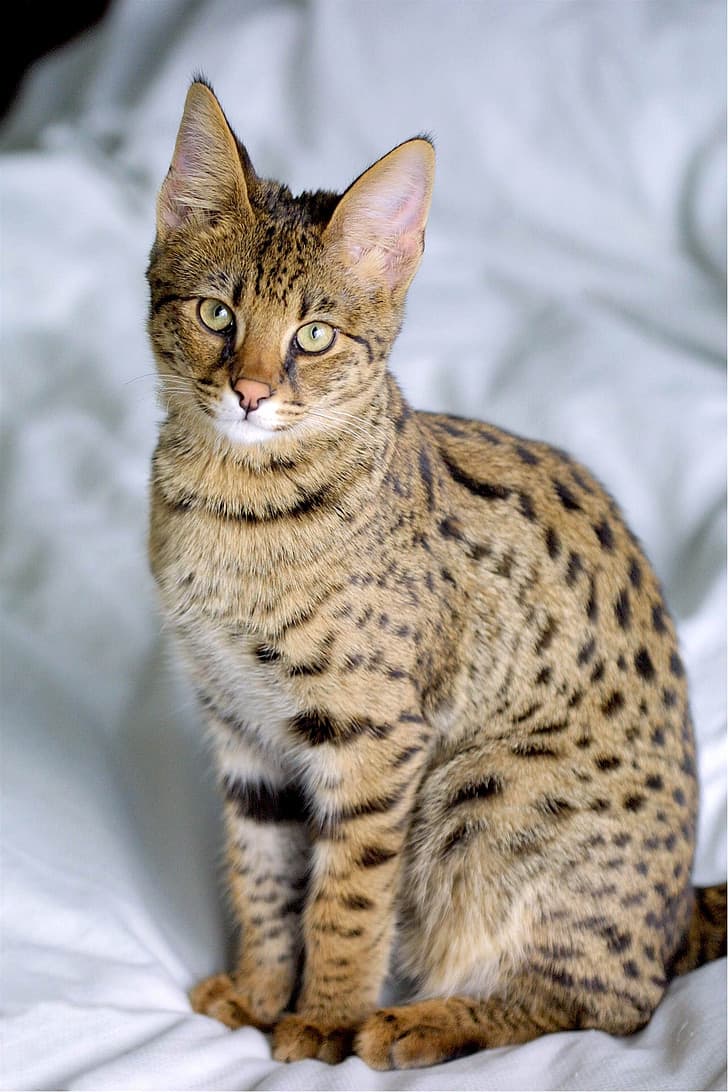Savannah

Height
Male:36,43 Female:36,43Lifespan
12-20 yearsPedigree
NoWeight
Male: 5,4-11,3 kg Female: 5,4-11,3 kgPros
- Striking appearance
- intelligent and trainable
- loyal and affectionate (with proper socialization)
- energetic and playful
- can be leash-trained
- often enjoys water
- unique personality
- relatively healthy breed.
Cons
- High cost
- demanding of attention
- can be destructive if bored
- may not be suitable for households with small pets (birds
- rodents
- fish)
- potential for breed-specific health problems (though still being studied)
- may be illegal or restricted in some areas
- require a very experienced owner
- loud vocalizations.
Introduction of the Savannah Cat
Savannah cats are a unique and fascinating hybrid breed that combines the exotic beauty of a serval with the domestication of a house cat. They are known for their large size, striking appearance, and intelligent personalities.
Savannah cats were first developed in the 1980s by crossing a serval with a domestic cat. The resulting kittens were a unique blend of both species, with the serval's exotic features and the domestic cat's tameness and affection.
Today, Savannah cats are bred through multiple generations to maintain their unique characteristics while reducing the wild instincts of their serval ancestors. They are available in a variety of patterns and colors, including spotted, marbled, and black.
Characteristics of the Savannah Cat
- Size: Savannah cats are large cats, with males typically weighing between 15 and 25 pounds and females weighing between 10 and 15 pounds.
- Appearance: Savannah cats have long, slender bodies with tall, slender legs. They have large, expressive eyes and distinctive spotted or marbled coats.
- Personality: Savannah cats are intelligent, curious, and playful cats. They are known for their friendly and affectionate nature, and they make great companions for families with children.
- Health: Savannah cats are generally healthy cats, but they can be prone to certain health issues, such as hypertrophic cardiomyopathy (HCM) and polycystic kidney disease (PKD).
Care of the Savannah Cat
- Diet: Savannah cats should be fed a high-quality diet that is rich in protein and low in carbohydrates.
- Grooming: Savannah cats have short, easy-to-care-for coats that only require occasional brushing.
- Exercise: Savannah cats are active cats that need plenty of exercise. They should have access to a large space to run and play in.
- Companionship: Savannah cats are social cats that enjoy the company of other cats and humans. They should not be left alone for long periods of time.
Conclusion
Savannah cats are unique and fascinating cats that make great companions for families with children. They are intelligent, curious, and playful cats that are always up for a good time. If you are looking for a cat that will turn heads and bring joy to your life, a Savannah cat may be the perfect choice for you.
Characteristics
Activeness
Docility
Friendliness
Grooming
Hardiness
Health
Independence
Intelligence
Need for Attention
Playfulness
Shedding
Vocality
Are you looking to buy the Savannah breed?
See current available pets or share this breed with your friends!